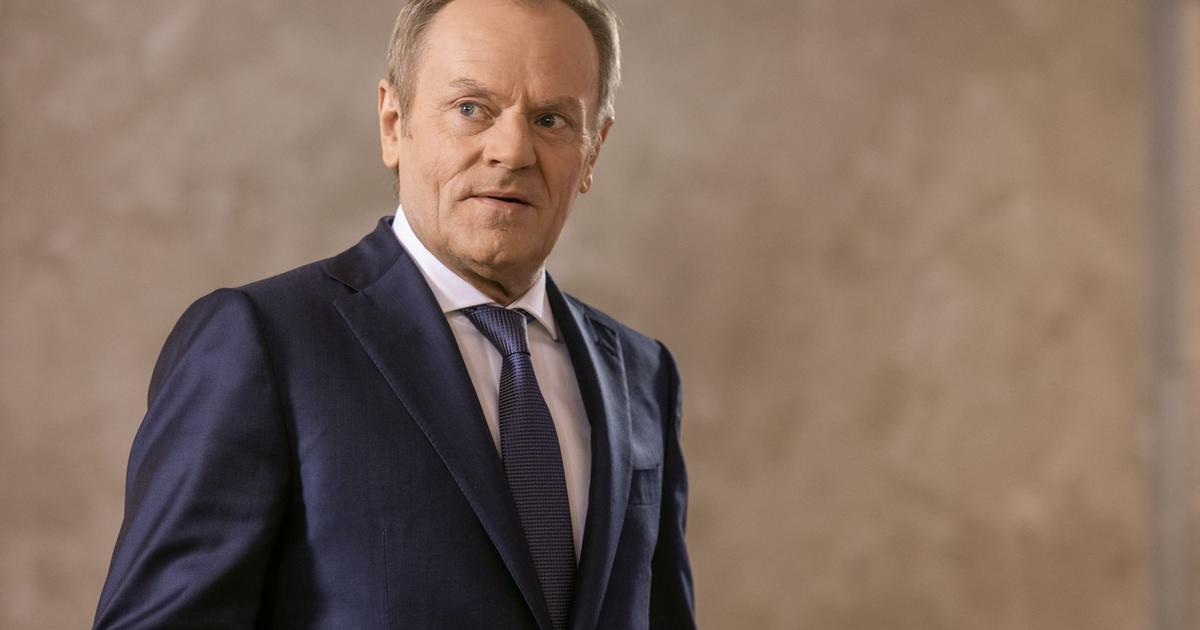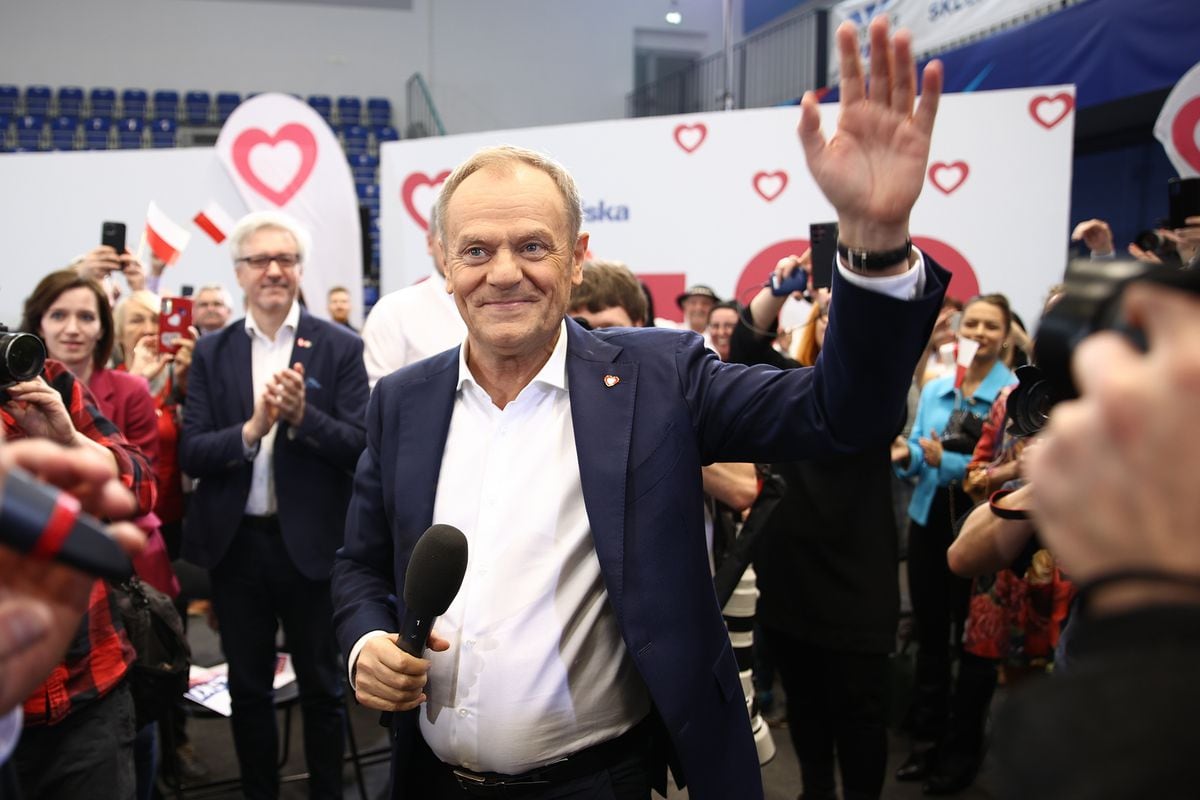Poland's legislative elections are about five months away and the political atmosphere in a deeply polarised country is already feverish. More than 100,000 people marched through the streets of Warsaw on Sunday under a broad slogan — "Against high prices, theft, lies and for free elections" — on the 34th anniversary of the first partially free elections in 1989. The massive protest has exceeded forecasts, with an attendance of between 100,000 and 150,000 participants, according to police sources, and half a million, according to the City Council of the capital, in the hands of the liberal opposition.
The march follows the passage this week of the so-called Tusk law, which will create a commission to examine Russian influence between 2007 and 2022. Critics say the rule is designed to oust Donald Tusk, leader of the main opposition party and prime minister from 2007 to 2014.
After criticism from the opposition, but also from the United States and the European Union, the country's president, Andrzej Duda, tried to calm tempers on Friday by presenting far-reaching amendments to the law that he himself had approved on Monday. But it was too late. The alarms about a possible attempt to interfere in the elections had already been activated and this Sunday the main liberal opposition forces have toured the capital, including those who did not plan to participate when Civic Platform (PO), Tusk's party, called the march last April.
The Polish capital has been taken by a demonstration in which the epic dominated in defense of democracy and against the attacks on the rule of law of the ultraconservative Government of Law and Justice (PiS), although there have also been some rude banners against the party in power. Alongside the active political leaders has marched Lech Walesa, the well-known trade union leader who confronted the communist regime at the head of the Solidarity union and who was the first democratically elected president of Poland since 1926. Two survivors of the Warsaw Uprising against Nazi occupation in 1944 have also participated. "You are participating in the greatest event in the history of democratic Poland," Tusk said, feeding that spirit of resistance.
"We are going into these elections to win, to hold the guilty to account, to make amends for the wrongs committed and, consequently, to reconcile Polish families. And I make you a promise: victory, fixing mistakes, repairing grievances and reconciliation," the former prime minister told the crowd.
With this march, Tusk, who is not yet officially the PO candidate, comes out reinforced from the challenge carried out this week by the Government with the law with which it intends to corner him. The former president of the European Council and the European People's Party halted his party's free fall and boosted it more than 10 points in the polls when he returned to the Polish political scene in mid-2021. "The problem is that his figure is very negative for PiS voters, and also for the left," says Ben Stanley, a researcher at the Center for the Study of Democracy at SWPS University in Warsaw.
The Government's campaign against him is fierce. They accuse him of having been too in tune with Angela Merkel's Germany, and at the same time, Vladimir Putin's Russia. Filip Pazderski, an analyst at the Institute of Public Affairs think tank, said by telephone that government-controlled public television often aired a clip of Tusk's voice in 2008 saying that dialogue with Russia was needed alongside images of victims of massacres perpetrated by Russians in Ukraine, such as Bucha's.
Tens of thousands of people have been arriving in Warsaw in the morning by bus, private car and train from all over the country, and rallies have been organized in other cities. The Tusk Law has generated "an energy, an anger", which has agitated opposition voters, as Pazderski explains. But the elections, which are assumed to be in October, are still at least five months away. The vigor of this Sunday may dissipate during the summer, the analyst notes.
Prime Minister Mateusz Morawiecki has sought to downplay the impact of the demonstration. "It makes me laugh a little that old foxes who have been in politics for many, many years organize a march against the Government and present it as a spontaneous citizen protest," he said, according to the PAP agency. This week, PiS crossed a red line in its country with a spot against the call that superimposed images of the Auschwitz concentration camp.
PiS, in the lead
Jaroslaw Kaczynski's PiS leads the polls, but with about 35% of voting intentions, it would not have enough to govern alone. The center-right Civic Platform party, which polls give 28 percent, would also need to seek support or coalition partners to come to power. Among the formations that could have the keys to government is the extreme right of Konfederacja Wolnosc i Niepodległosc (Confederation), which after a few months of sustained growth has slowed down with 10%. The other is the coalition baptized as Third Way, which would become a third force, with 13% of the votes, and is integrated by the centrist Polska 2050, of Szymon Holownia, a well-known television presenter, and the Polish People's Party (PSL), an agrarian formation. After the elections, PiS is likely to want to seek the support of the Confederation, but the game of alliances in Poland is open and analysts do not dare to make a forecast.
Sociologist Jaroslaw Flis, of the Jagiellonian University in Krakow, explained in a Zoom conversation a few weeks ago that the Polish electoral system is based on the D'Hondt method, like the Spanish one, and rewards coalitions. For months the possibility of a great agreement that would unite the liberal opposition has been considered, as happened in Hungary and Turkey, although in both countries the opposition candidates ended up crashing against the rulers. The unity exhibited this Sunday by these forces "will not result in a coalition," says Stanley, who believes that the march "will not have an electoral effect, but leaves a powerful message: that they can unite when necessary."
The official campaign will begin after the summer, after the official call for elections, but the box of electoral promises has already been opened. PiS has promised to increase the monthly allowance per child under 500 from 800 to 111 — from 180 to almost €18; Free medicines for the elderly and children and toll-free highways. PO, which seeks to expand its electoral base with more social measures compared to its traditional defense of the free market, has signed up to the idea of family benefits and housing access programs.
Analysts believe economic security will be one of the main themes of the campaign. Poland has blocked 35.400 billion euros from the European recovery plan for the pandemic, which Brussels will not release until a series of reforms are completed that guarantee, among other aspects, the rule of law and judicial independence. The government's junior partner, the eurosceptic formation that has renamed itself sovereign Poland, is expected to base its campaign on attacking the European Union and PiS for allegedly kowtowing to the Commission.
Support for neighboring Ukraine is a factor that unites government and opposition. PiS gained some points at the start of Russia's invasion in the polls, but its support has fallen slightly even though it continues to lead international aid to Kiev. In the coming months anything can happen on both sides of the border and it was already seen, during the grain crisis, that the ultraconservative government will prioritize the interests of its potential voters, as it did with farmers unhappy with Ukrainian competition.
The mobilization of their own voters will be key in these elections. The opposition has shown this Sunday that it has the power to convene. But that happened in Warsaw. PiS has its electoral fishing ground in the countryside and in small towns. That other Poland is driven by what it sees as liberal attacks on its traditional values of family and religion. Therefore, it begins to sound like the government's supposedly favorite date for the elections on October 15, one day before John Paul II Day. Two investigations have recently questioned the Polish pope's response to cases of pedophilia when he had not yet reached the Vatican, and PiS has tried to profit as if it were an attack on Poland. Both will try to keep alive the flames with which they hope to activate their voters next fall.
Follow all the international information on Facebook and Twitter, or in our weekly newsletter.
Subscribe to continue reading
Read without limits
Read more
I'm already a subscriber





